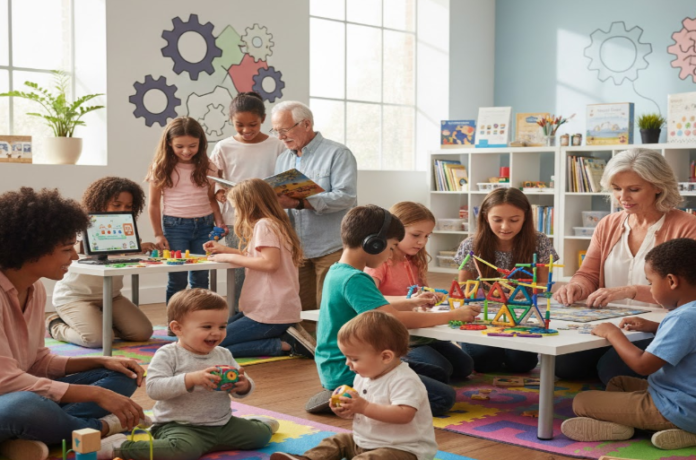Cognitive development plays a key role in children and adults learning, process information, and engage with the world around them. It includes the growth of skills such as memory, problem solving, language, and attention. Using engaging tools like sensory toys can make this developmental journey more effective and enjoyable.
Understanding Cognitive Development
Cognitive growth begins early and continues throughout life. It involves building mental pathways that help individuals understand their environment and solve everyday challenges, explore their surroundings, form relationships, and build foundational skills for school and beyond.
How Tools Influence the Learning Process
Interactive tools create a bridge between imagination and understanding. When children engage with well designed materials, they strengthen their mental abilities with simple activities like stacking, sorting, and exploring textures stimulate different areas of the brain.
The Power of Play in Learning
Play is one of the most effective ways to encourage cognitive development, children learn to think critically, make decisions, and express themselves freely. The right tools turn playtime into an opportunity for meaningful growth, blending enjoyment with structured learning experiences.
Encouraging Exploration and Imagination
When tools are designed to be open ended, they allow children to use their imagination without strict rules. This kind of play inspires creativity and helps develop problem solving abilities, encouraging kids to experiment, make choices, and adapt their thinking as they explore new possibilities.
Sensory Experiences and Brain Growth
Sensory engagement has a direct impact on how the brain processes and retains information. Experiences that involve touch, sound, sight, and even smell help stimulate neural pathways, making learning more memorable and enjoyable.
Multi Sensory Stimulation for Better Focus
Children with attention difficulties, sensory stimulation can be especially helpful in improving focus and calming the mind. Activities like squeezing soft textures, playing with water, or exploring different sounds allow them to process sensory input in a safe and structured way.
Tools That Support Different Stages of Growth
As the people we care about get older, the way they think and learn changes. The tools we use might be all about figuring out things like shapes and noises. While tools for older kids the focus shifts to skills like solving problems, remembering things, and using language. We are giving them the right kind of brain help at the right time so they can grow best.
Adapting Tools to Individual Needs
Kids all learn on their own, Some really pay attention to what they see, while others learn better by touching things or moving around. It is up to parents, teachers, and caregivers to really watch them and make sure they get the right stuff to help them succeed.
Cognitive Development Beyond Childhood
Although cognitive development is most rapid during early years, the process continues into adolescence and adulthood. Engaging the brain through activities such as puzzles, reading, and hands-on learning can maintain mental agility and improve focus at any age.
Lifelong Benefits of Interactive Learning
Everyday activities that involve observation, problem solving, or physical interaction with objects help keep the brain active. Even simple routines, when approached creatively, can support continued cognitive development and mental well being throughout life.
Making Learning Accessible and Enjoyable
The effectiveness of cognitive development tools depends on how they are used. They encourage natural curiosity and willingness to learn. Caregivers and educators can create spaces that are engaging, safe, and made to individual interests.
Finding Trusted Sources for Development Tools
Choosing well made products ensures safety, durability, and educational value, giving both children and adults tools they can enjoy for years. Reliable suppliers like Health Mart offer a range of high quality learning aids designed to meet different developmental needs.
Conclusion
Cognitive development is a continuous process that shapes how individuals think, learn, and interact with their environment. Engaging tools that encourage sensory exploration, imaginative play, and critical thinking are essential for supporting this growth at every stage.
By selecting tools that match individual needs and creating supportive learning environments, caregivers and educators can foster lifelong skills and confidence. Whether through playful exploration in early years or mentally stimulating activities later in life, the right tools can transform learning into an enjoyable and meaningful journey.









